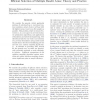2594 search results - page 79 / 519 » Elements of a Theory of Simulation |
ASP
2003
Springer
14 years 2 months ago
2003
Springer
Abstract. Ordered Choice Logic Programming (OCLP) allows for preferencebased decision-making with multiple alternatives and without the burden of any form of negation. This complet...
LOPSTR
2001
Springer
14 years 1 months ago
2001
Springer
In this paper we define a sequent calculus to formally specify, simulate, debug and verify security protocols. In our sequents we distinguish between the current knowledge of prin...
CDC
2008
IEEE
13 years 10 months ago
2008
IEEE
This work outlines two approaches for small unmanned aerial vehicles (UAVs) performing surveillance with fixed cameras. Small UAVs present significant control challenges, due to re...
ICML
2010
IEEE
13 years 9 months ago
2010
IEEE
We consider the general, widely applicable problem of selecting from n real-valued random variables a subset of size m of those with the highest means, based on as few samples as ...
IPL
2008
13 years 8 months ago
2008
Slicing is a program transformation technique with numerous applications, as it allows the user to focus on the parts of a program that are relevant for a given purpose. Ideally, ...

